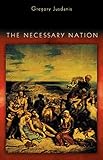The Necessary Nation / Gregory Jusdanis.
Material type: TextPublisher: Princeton, NJ : Princeton University Press, [2011]Copyright date: ©2001Edition: Course BookDescription: 1 online resource (272 p.)Content type:
TextPublisher: Princeton, NJ : Princeton University Press, [2011]Copyright date: ©2001Edition: Course BookDescription: 1 online resource (272 p.)Content type: - 9780691089027
- 9781400824151
- 306 320.54
- JC311 .J87 2008
- online - DeGruyter
- Issued also in print.
| Item type | Current library | Call number | URL | Status | Notes | Barcode | |
|---|---|---|---|---|---|---|---|
 eBook
eBook
|
Biblioteca "Angelicum" Pont. Univ. S.Tommaso d'Aquino Nuvola online | online - DeGruyter (Browse shelf(Opens below)) | Online access | Not for loan (Accesso limitato) | Accesso per gli utenti autorizzati / Access for authorized users | (dgr)9781400824151 |
Browsing Biblioteca "Angelicum" Pont. Univ. S.Tommaso d'Aquino shelves, Shelving location: Nuvola online Close shelf browser (Hides shelf browser)

|

|

|

|

|

|

|
||
| online - DeGruyter Hamlet in His Modern Guises / | online - DeGruyter White Diaspora : The Suburb and the Twentieth-Century American Novel / | online - DeGruyter Betrayal and Other Acts of Subversion : Feminism, Sexual Politics, Asian American Women's Literature / | online - DeGruyter The Necessary Nation / | online - DeGruyter Gender, Class, and Freedom in Modern Political Theory / | online - DeGruyter Getting Saved in America : Taiwanese Immigration and Religious Experience / | online - DeGruyter Offside : Soccer and American Exceptionalism / |
Frontmatter -- CONTENTS -- ACKNOWLEDGMENTS -- INTRODUCTION -- CHAPTER ONE. On Nationalism -- CHAPTER TWO. The Autonomy of Culture? -- CHAPTER THREE. The Bastion of National Culture -- CHAPTER FOUR. Progress and Belatedness -- CHAPTER FIVE. Political Nations -- CHAPTER SIX. The End of Identities? -- CHAPTER SEVEN. Federal Unions -- References -- Index
restricted access online access with authorization star
http://purl.org/coar/access_right/c_16ec
In this controversial look at nationalism, Gregory Jusdanis offers a sweeping defense of the nation as a protector of cultural difference and a catalyst for modernization. Since the end of the Cold War, the nation-state has undergone intense scrutiny among critics in the media and the academy. Many believe that civic nationalism may be fruitful but that cultural nationalism fosters xenophobia and backward thinking. Jusdanis, however, emphasizes the positive collaboration between nation-building and culture. Through a series of critical readings of multicultural, postcolonial, and globalization theories, the author reveals how nationalism enables people to defend their distinctive ways of life, to fight colonial oppression, and to build an independent society of citizens. He explains why people over the last two hundred years have politicized their ethnic identities and have sought a union of culture and power within an autonomous nation-state. While seeking to defend nationalism, Jusdanis also examines its potential to unleash extraordinary violence into the world. He thus proposes federalism as a political solution to the challenges posed by nationalism and globalization. Jusdanis applies the tools of disciplines ranging from anthropology to philosophy, as he explores the nation-building projects of numerous and diverse countries around the world. What emerges is a fresh perspective on the subjects of national culture, identity, political nations, globalization, postcolonialism, and diaspora.
Issued also in print.
Mode of access: Internet via World Wide Web.
In English.
Description based on online resource; title from PDF title page (publisher's Web site, viewed 29. Jul 2021)


